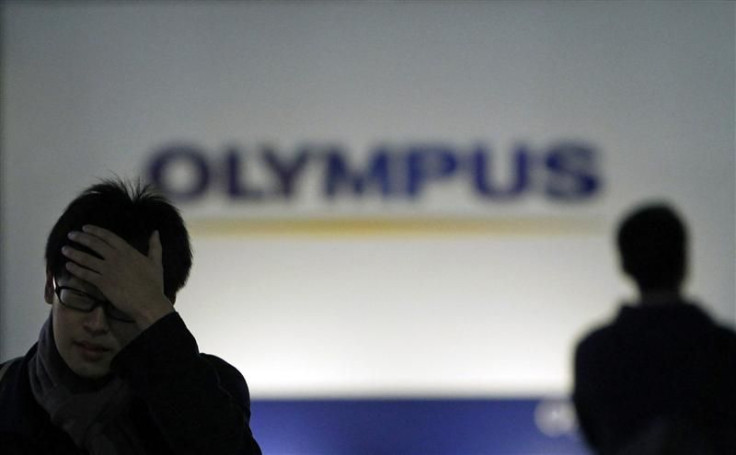Japanese Watchdog May Seek to Impose Levy on Olympus: Source

Japan's securities watchdog may recommend that a levy be imposed on the Olympus Corp. for false financial reports, a source familiar with the case said Sunday. The move could prevent a delisting of the company's shares over one of the country's biggest corporate scandals.
However, the Securities Exchange and Surveillance Commission (SESC) may urge that criminal charges be sought against former executives and others involved in dubious merger-and-acquisition deals used to hide big investment losses, the source added.
Japanese authorities are investigating Olympus after the 92-year-old maker of cameras and endoscopes admitted last week that it hid investment losses for decades by using funds from M&A payments. Media reports have said police, prosecutors, and regulators were joining forces in a rare collaborative effort to examine the cover-up.
The Olympus scandal has rekindled concern about corporate governance in Japan and worries that other firms may have engaged in similar misdeeds. Politicians have begun considering legal revisions to tighten controls.
But authorities also appear concerned about the fallout for investors and the market were Olympus to be delisted. Olympus' largest foreign shareholder, Southeastern Asset Management Inc., based in Memphis, Tenn., said last week that delisting would have negative ramifications for foreign investment in Japan.
The source told Reuters that the SESC would make a final decision on its recommendations to the Financial Services Agency (FSA) after seeing the results of a third-party panel investigating the case, as well as corrected versions of Olympus' financial statements.
The panel's report is due early next month.
The SESC believes Olympus' concealed losses, which could have exceeded 130 billion yen ($1.7 billion) at their peak, were cleared by 2008 and that there is nothing wrong with the firm's current financial position, the Yomiuri newspaper said.
Criminal prosecution of Olympus could cause the firm to be delisted, resulting in a serious impact on investors, the Yomiuri said in its English-language edition. The commission is therefore planning to deal with the company's window-dressing through administrative sanctions, the newspaper added.
Reduced Equity
Tokyo's stock exchange has told Olympus it will be delisted if it fails to report first-half earnings by Dec. 14, which could effectively leave the company cut off from equity capital markets. Its shares have already lost more than three-quarters of their market value since the scandal erupted on Oct. 14, when it fired British CEO Michael Woodford.
Delisting would take effect on Jan. 15 in principle should Olympus not meet the reporting deadline. Even if Olympus meets the deadline, the bourse could still decide to delist the company, depending on the scale of its past misreporting.
The source also told Reuters that the SESC was considering recommending that criminal charges be brought against former executives and others involved in dubious M&A deals used to conceal losses on securities investments.
The scandal burst into the open when Woodford said he had questioned excessive advisory payments made by Olympus for its purchase of British medical device firm Gyrus in 2008 as well as the buyout of three tiny domestic companies unrelated to its core camera and endoscope businesses.
Olympus President Shuichi Takayama on Tuesday blamed former President Tsuyoshi Kikukawa, who quit on Oct. 26, Vice President Hisashi Mori, and internal auditor Hideo Yamada for the cover-up. He said he would consider criminal complaints against them. Mori was fired on Tuesday, and Yamada offered to resign.
Olympus has decided to correct its earnings for the past five years after examining its accounting practices dating back to the 1990s -- when the cover-up began -- so that it can file accurate accounts for the first half of 2011, the Nikkei business daily said on Sunday.
Most financial losses will be recorded in the firm's financial statements for the business year ended in March 2001, when stricter accounting rules were introduced, it added.
The corrections will result in a decrease in Olympus' equity ratio and require reassessment of its goodwill, which was valued at 168.2 billion yen at the end of this June, the Nikkei added.
In a move likely to put more pressure on the company, a former executive echoed the view of British fund Baillie Gifford & Co, which says it holds more than 4 percent of Olympus, and he called on the firm's employees to back his campaign to reinstate Woodford as the firm's president.
Koji Miyata, who, according to the Asahi Shimbun newspaper, served as a director at Olympus from 1995 until retirement in 2006, has begun an online campaign urging workers to sign a petition to bring back the ousted Briton, stressing only he could be fully trusted by investors.
Clearly, reinstating Michael as president and coming completely clean with the global community is the first step in revitalizing Olympus, Miyata said on the Web site that also appeared to list several employees who had decided to support the action.
(Additional reporting by Antoni Slodkowski and Linda Sieg; Writing by Linda Sieg; Editing by Robert Birsel)
© Copyright Thomson Reuters 2024. All rights reserved.











